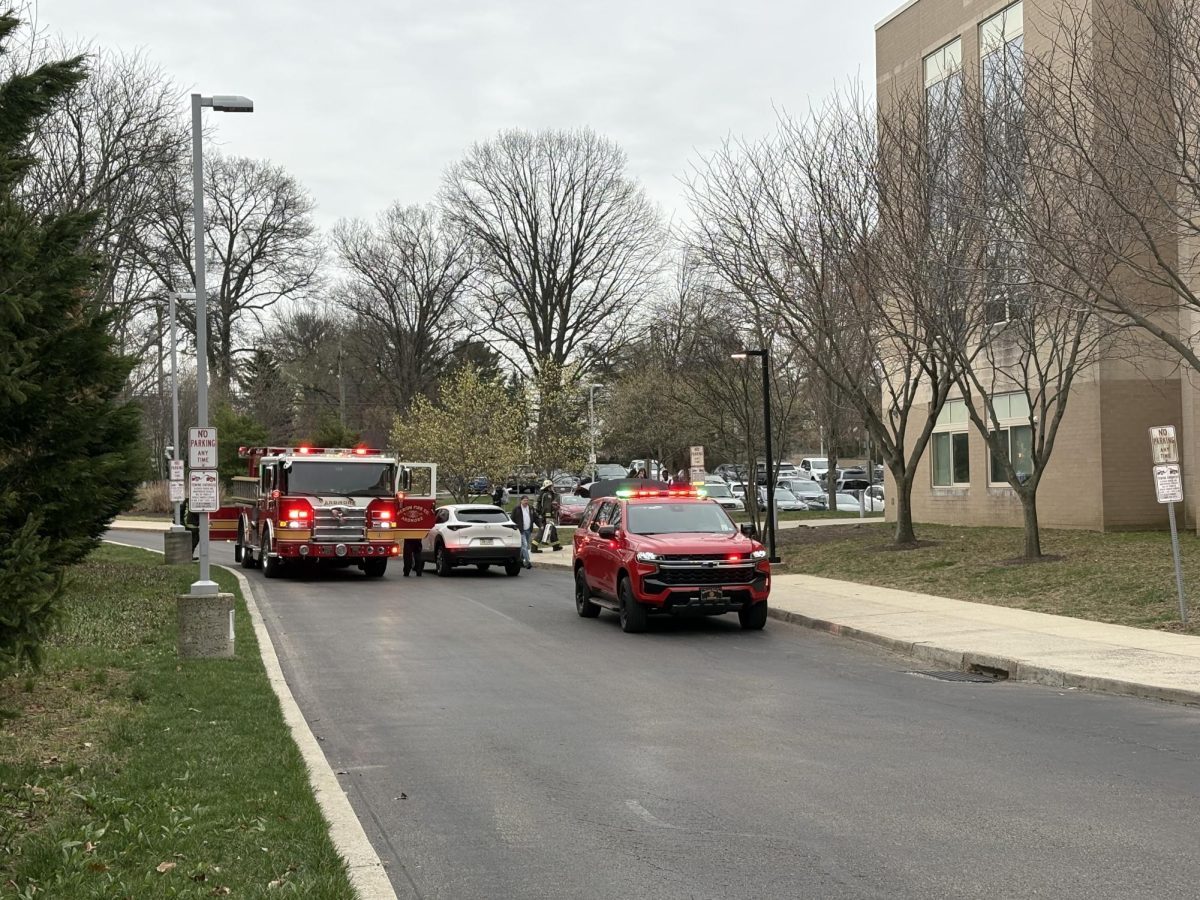Five million dollars.
That’s the size of LMSD’s budget shortfall for the 2025-2026 school year. To address this $5 million gap, and in response to shifts in enrollment in the district, LMSD will not be hiring replacements for retiring teachers, such as social studies teacher John Grace and art teacher Dan Hazel, and is transferring teachers including music teacher Joshua Cooperstein and English teacher Tiffany Kannengieszer to positions at Harriton next year.
When Hazel retires at the end of this year, LM’s art department will shrink from five full time members down to four. In lieu of hiring a full time replacement, a current Harriton teacher will be splitting their time between the two schools, teaching three classes at Harriton and two at LM, according to art department head Russell Loue.
To make up for this shortfall, the art department will be cutting class offerings and combining previously separate levels. This includes offerings like Advanced Communications Design, an upper level class that teaches graphic design and various forms of digital art. The communication design program, which is currently split into three levels (Com Design 1, Com Design 2, and Advanced Com), will be combined into one class. “As a student who’s very passionate about art, this is the one class where I felt accepted…I felt like I had a voice there and by taking that away you’re taking my voice away from me,” Advanced Communications Design Student Hailey Miller ’26 commented on this change. “How am I gonna learn new skills if we have to teach the younger classes at the same time. Would they ever combine classes like this in math? In Global?” she asked.
Loue highlighted that “we’ve had a slight population drop, but we’ll still have 350 more students than Harriton does. But they have more art teachers than we do. They offer more art classes than we do.” Even though LM currently has 406 more students than Harriton, Loue reports that there are more classes and teachers in Harriton’s art department, a disparity that will continue when Hazel leaves.
Grace is also retiring at the end of this year, and LMSD is not currently planning to hire a replacement for him. When discussing Grace’s retirement, social studies department head Chad Henneberry said, “It’s a great loss to the department; he had years and years of institutional knowledge and wisdom that he would consistently and positively share with his students and colleagues; Mr. Grace is a teacher that is not easily replaced.”
“We’re fortunately in a spot where, because enrollment will be coming down, this will necessitate a reshuffling of classes among teachers but it will not lead to a larger number of students per class,” Henneberry continued. LM is currently home to 370 freshmen, 439 sophomores, 412 juniors, and 456 seniors. But in fall 2025, LM is only expecting to welcome 296 freshmen into its ranks, bringing total enrollment down by over 150 students—from 1677 down to 1518. According to Henneberry, this drop in enrollment will counteract the effect of Grace’s retirement.
Grace is also stepping away from a 25-year role as head Players coach, a separate salaried position that the district is required to fill in his absence. While LM is not bringing in any new staff as full-time subject teachers, LMSD is still hiring for a “Drama Coordinator” at LM, according to the job listings linked on the official “Join the LMSD Team!” page.
Although Harriton and Black Rock Middle School are both expecting enrollment increases next year, LMSD does not appear to be currently hiring any permanent staff at either school (though they are currently accepting applicants for a long-term substitute for Science classes at BRMS for the upcoming school year). Instead, to fill the needs of Harriton and Black Rock’s growing student bodies, teachers at LM are being transferred out to other schools within the district.
Music teacher Joshua Cooperstein, who currently splits his time evenly between LM and Harriton, will not be returning to LM next year and will instead be working full time at Harriton. The music department will shift from having 4 teachers to three, and will not be running their Music Major and Music and Modern Culture classes next year as a result of the cuts.
Cooperstein’s current classes in Music Technology will be taken on by other members of the department. But some music students, like Nate Warren ’25, worry that the class cannot function the same way without him. “Keeping the music tech curriculum without Coop is not really keeping the music tech curriculum,” Warren reports. “Datsko is awesome, but Coop did his post-graduate work on creating this curriculum. It’s his brainchild, he knows how to teach it, and he understands it in a way that no other teachers at this school do. Keeping the curriculum and not keeping Coop is something of an empty gesture.”
Warren, who took Music Technology classes with Cooperstein, stressed the impact his departure will have. “I think it’s disrespectful of the work that teachers have put in at this school and the relationships they have found at this specific institution… it’s taking people for granted who have made a relationship with this building and this particular school in a way that feels rushed and underthought and poorly implemented, and I know that no one is happy with [the change]. No teacher I’ve heard from that’s being forced to go, wants to go.”
Music students also shared negative reactions to the lost offerings, such as Oren Goldberg ‘25, who took Music and Modern Culture with Aaron Datsko, one of the music classes slated to be eliminated at the end of this year. Goldberg shared that he understands why the department chose to cut the class, saying that “It’s really niche,” but that “It’s about the history of American, (mostly) popular music. It was interesting, it was important. It sucks that they’re cutting it, but I understand why.”
Similar examples of cut classes and teacher transfers have been reported in departments across the school. In the English Department, Ms. Kannengieszer has announced to her classes that she will no longer be teaching at LM next year, according to Sora Davison ‘25. “Mrs. Kannengieszer’s absence next year will have a large impact on our department,” says English Department head Brian Mays. ”We are a department that has not experienced a transfer in the last 15 years, so it’s been an adjustment for us.” Mays confirmed that at time of publication, Ms. Kannengeiszer is set to be teaching at Harriton next year, and also shared about the role she would be leaving at LM, saying “ Throughout her three years here, she has taught Film & Literature, Sports & Literature, and English 2. She has also worked to create team-building activities within the department, including designing T-shirts for the department and having fun, food-based competitions. More practically, it means that the five sections of students that Mrs. Kannengieszer would otherwise be teaching here at LM are getting absorbed by other teachers in the department,” a result similar to the class reshuffling that will be taking place in the Social Studies and Unified Arts departments.
On March 27th, Communications teacher Diane Werder emailed families, announcing that Communications class will no longer exist in LMSD after this year. In her email to families, Werder said, “Mostly I’m sad for the students who have benefitted from this support, but I’m hopeful that administration has considered this for next year and there will be a plan moving forward.”
According to Dylan Silberman ‘25, Communications classes have been exceptionally beneficial to students who struggle with executive dysfunction or need additional support to succeed in their classes, but do not meet the standards of needing support from the Special Education department. “There’s a really important difference between the Special Education department versus something like Communications. In particular, students having an IEP versus a 504 plan,” reports Silberman. “Communications is a class that should happen at Lower Merion High School because it provides support for those that do not necessarily meet the qualifications for support in an instructional support lab, but are also in need of an adult they can turn to to keep them on track educationally and make sure that they’re on a path to success.”
Smaller changes are also coming as part of LM’s attempts to balance its budget. For example, LMSD is reevaluating late bus runs as a cost saving measure. Instead of this year’s two-run schedule, one at 4:45 PM and another at 5:45 PM, the district will be running only one late bus at 5:30 PM from both high schools. This bus will only run Monday through Thursday; Friday late buses will be eliminated entirely due to “low ridership and fewer after school activities on Fridays.” Similarly, middle school bus runs will occur at 4:30 PM, Monday through Thursday.
The 5 million dollar budget deficit that’s said to be driving these changes was first announced to the public in the district’s 2025-2026 budget overview. This year’s budget totals 339 million dollars, a 10 million dollar increase in comparison to last year’s 329 million dollar budget. In their presentation, the district announced that factors like property reassessments, declining investment returns, inflation, and an increase in both mandated programs and personnel costs led to the shortfall.
“It’s odd hearing that we’re struggling,” Loue shared. “I live in the township. I pay taxes in the township, my town. My taxes are a third of what the taxes are in Havertown for the same value home…So this is a decision that [says] times are tough because we don’t want to raise taxes. And I know it’s more complicated than that, but at the same time, it kind of isn’t.”
Across the board, LM students can expect to see a significantly smaller incoming class of freshman next year, and with them a notably changed landscape across many departments. As LMSD attempts to address the budget shortfall, we can expect to see more changes in staffing and programming.







